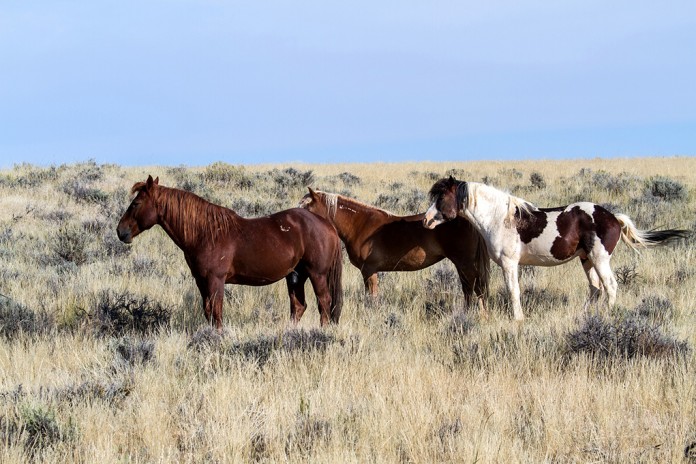Phoenix, AZ (November 22, 2016)… In a sign on letter sent to U.S. Agriculture Secretary Tom Vilsack this week, Republican and Democrat members of the Arizona House Delegation called on the U.S. Forest Service (USFS), a division of the USDA, to immediately approve a humane fertility control program to manage the Salt River horses of the Tonto National Forest. The letter was written by Congressman Trent Franks and signed by his House colleagues, U.S. Representatives Kyrsten Sinema, Paul Gosar, Raul Grijalva, Matt Salmon and Martha McSally.
The Salt River Wild Horse Management Group and its national partner, the American Wild Horse Preservation Campaign, are commending the Arizona House delegation for its continued leadership in the fight to protect the cherished wild horse herd, which lives in the Tonto National Forest near Phoenix. The groups said that little progress for a humane wild horse management plan for the horses has been made, despite passage of state legislation, signed into law by Governor Doug Ducey in May, intended to protect the horses.
The congressional letter comes after Tonto National Forest supervisor Neil Bosworth rejected the horse advocacy groups’ October request to authorize the use of PZP on the herd. He responded that the Forest Service doesn’t have authority to manage the horses and therefore cannot authorize anyone else to manage them. He referred the groups to the State Agriculture Department. At this time, however, the Arizona Department of Agriculture does not have the authority over the horses.
The groups believe that the Forest Service has clear authority to authorize the PZP program for wild horses who live on Forest Service lands. Rep. Franks and his colleague, in the letter, agree.
The horse advocacy groups say that the PZP fertility control vaccine, which can be delivered via remote darting, would be used to limit population growth and maintain a healthy population within the herd’s habitat on the Salt River in order to prevent a future need to remove wild horses. They said time is of the essence because the ideal time frame for PZP vaccination is right now and if not implemented they fear that new roundup plans may be in the future.
“We thank Rep. Trent and his colleagues for once again standing up for the Salt River horses,” said Simone Netherlands, president of the Salt River Wild Horse Management Group.
“Using PZP now will keep the herd to a healthy size for its habitat and protect horses from being subject to roundups and removal,” she continued. “The public does not want to see the removal of horses from their home on the Salt Rive. Therefore this is the only humane path forward.”
The horse advocates are set to being the PZP program immediately – at no cost to either the State or the Federal government.
“This is a great opportunity for a public/private partnership to manage and protect these beloved horses at no cost to the taxpayers,” said Suzanne Roy, Executive Director of the American Wild Horse Preservation Campaign, which manages the world’s largest humane birth control on wild horses in Nevada’s Virginia Range. “We have people certified to dart the horses with PZP and all the work will be privately paid for and performed by volunteers. All we need is approval to act, so we can save these horses.”
PZP (Porcine Zona Pellucida) is an organically derived vaccine that prevents pregnancy in female animals – including wild horses, bison, elephants and urban deer and more than 80 species of zoo animals. It doesn’t harm existing pregnancies, pass to other animals, or pass into the surrounding environment.
More than 40 wild horse advocacy groups and the Humane Society of the United States have called on the federal government to make more use of PZP as a way to end wild horse roundups and removals, which cost American taxpayers more than $80 million each year. The use of PZP fertility control was recommended by the National Academy of Sciences in its 2013 report, “Using Science to Improve the BLM Wild Horse and Burro Program: A Way Forward.”





